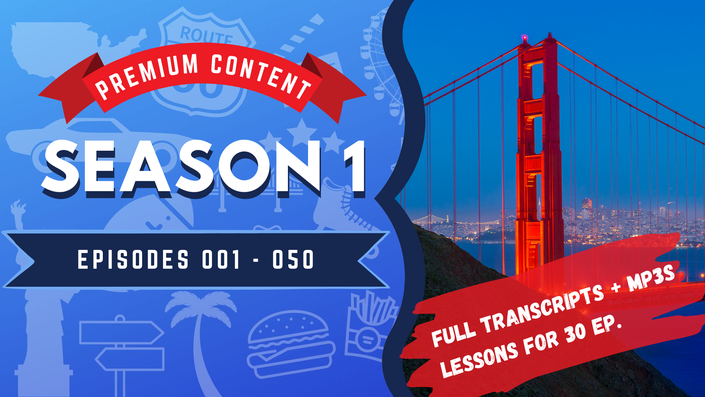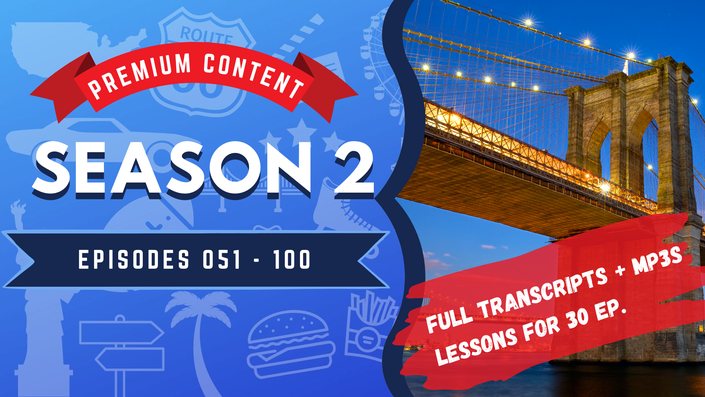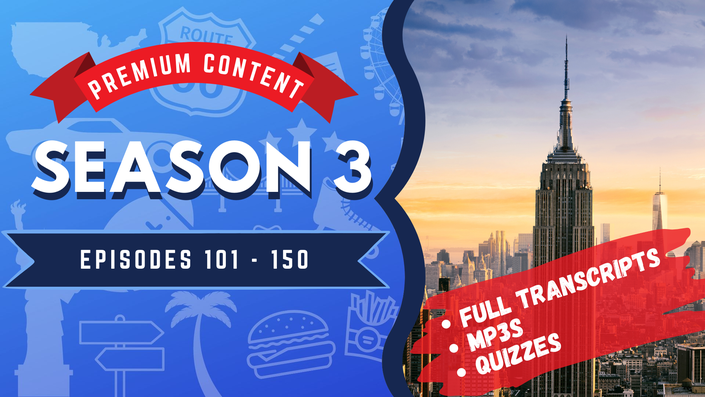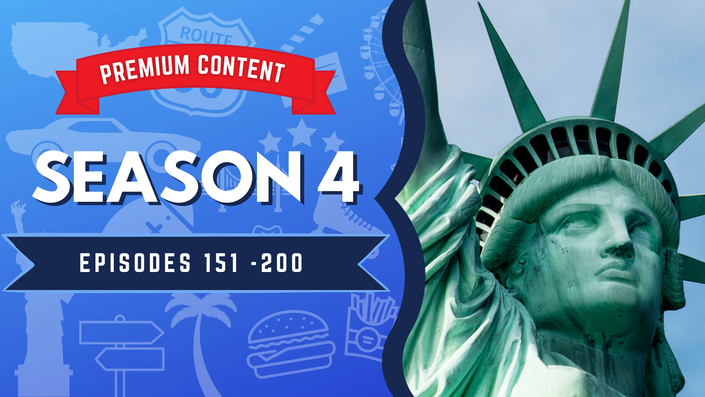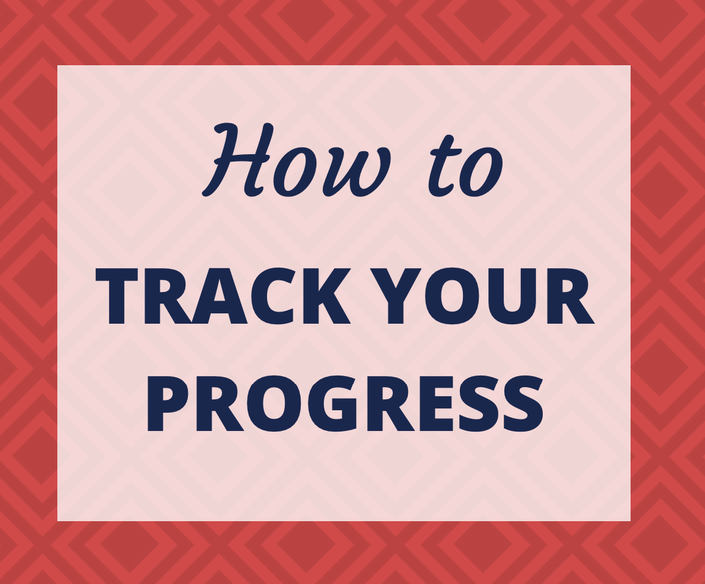150 - Season 3 Review.mp3: this mp3 audio file was automatically transcribed by Sonix with the best speech-to-text algorithms. This transcript may contain errors.
Hi, everybody. My name is Shana and this is the American English Podcast. My goal here is to teach you the English spoken in the United States. Through common expressions, pronunciation tips and interesting cultural snippets or stories, I hope to keep this fun, useful and interesting. Let's do it!
I can't believe it! We're on episode number 150. Thank you so much for tuning in wherever you are in the world. I hope you feel productive learning English while you're driving to work, cleaning your house, walking around the block, or even working out at the gym. I feel privileged to fill the free space in your day whenever that is, and I hope that continues for Season 4.
As you may know, this is the very last episode of Season 3, and I want to reflect on a number of different things. First of all, I want to talk about some statistics I find interesting, and then I want to go over what we spoke about in the last 50 episodes. It's been two years since I started Season 3, which is nuts, and we've covered so many fascinating topics regarding American culture and history. We've also spoken a lot about the language!
Before we begin, I want to share something personal. When I started this podcast four and a half years ago, about a month after my first daughter was born, I didn't know much about podcasting. To be honest, I knew a little bit of nothing about podcasting, so listening to early episodes makes me cringe a bit.
While I still find the stories so important in the scheme of American history and also entertaining, the quality of those episodes is most definitely not up to the standard that I have today. Thank you to all of you who listen to those episodes and have stuck around till now. The audio has gotten better and it means a lot that you're here.
Let's start with some stats.
Out of the many different apps to listen to podcasts, the majority of you, 48%, listen on Spotify. Spotify also tells me you like listening to Ed Sheeran and Taylor Swift, which is kind of funny. I didn't ask for that information, but yeah, I like them too.
The top five countries listening are the United States, Brazil, Japan, Vietnam and Mexico. So non-native English speakers in the United States listen the most. Although you guys are listening from every country in the world, which is so cool. I never expected to have that sort of reach.
Now, your favorite episode type, according to a survey I did on Instagram, was the expression episodes tied to a cultural fact or story. However, based on the statistics I have, the five most popular episodes in Season 3 were 5-minute English episodes and the expression episodes.
The most popular of the 5-minute English episodes was, well, the most recent episode, 149 - Injuries and Getting Hurt, where I told the story of an injury I got in Brazil that resulted in a trip to an indigenous hospital where I got stitches. The doctor stitched me up with a needle and thread. She sewed my skin back together. Now, there were a lot of terms in that episode, everything you need to talk about this topic in English. Once again, that's episode 149.
Another one of the most popular episodes in Season 3 was Grocery Shopping, episode 143, which you guys described as "useful." The goal of that episode, in addition to introducing vocabulary needed at the grocery store, was to help clarify common confusion on products and labels at US grocery stores. I'm glad you liked that one.
Episode 138 was also very popular. It was called How to Order a Cocktail in English. You can probably guess what that's about.
Then, last but not least, in the 5-minute English category, there was Winter, episode 115. In the Winter episode, I shared many terms related to a typical ski trip in Colorado; we talked about the Rocky Mountains -so stunning - and the many ski resorts.
The most downloaded episode of Season 3 was a culture lesson, episode 134.2, The Story of Starbucks. You guys must like coffee, or maybe it's just the fact that the story is fascinating.
Let's listen to a snippet from it.
"There were no coffee bars, nor was there much of a demand for espresso-based drinks. You purchased coffee beans and you either took them home as beans or we ground them for you in the store. Nobody expected to get a beverage at a Starbucks coffee store until after 1980."
What I found fascinating about the Starbucks story isn't just the business side of how it went from being a single shop in Seattle selling coffee beans to a global enterprise of shops serving coffee, it's how Starbucks embraced their location — Seattle, Washington — and built a magical coffee culture around the lifestyle and people who lived there, from their name to their logo.
You may like Starbucks, you may not, but there's no denying it has profoundly impacted US culture, from where we spend our time, the way we consume, how business is conducted, I could go on. I'm glad you liked it. Once again, that is episode 134.2.
Which brings me to the topic of culture. For many of you, it's important to connect on a deep level with people from the United States, maybe to make friends at a new job or connect as an exchange student or au pair. When we understand cultural references and can talk about them, you can make friends more easily.
The thing is, culture runs deep. It's deeper than just the food we eat and the clothes we wear on our backs. It's the stories we grow up with, whether they be fictional, like the stories of Dr. Seuss, who we heard about in episode 140.2, or the real and disturbing stories like the Milgram Experiment and the Monster Study, two psychology experiments I talked about in episode 103 and 129.2, respectively.
Do you remember those? The Milgram experiment analyzed obedience to authority. Will normal people, like you and me, administer shocks to someone who is screaming at the top of their lungs for us to stop. You probably think, No way, I'm normal, I would never do that.
You think you should look in on him, please?
Not once we've started the experiment.
But what if something's happened to the man, had an attack or something there?
The experiment requires that we continue. Go on, please.
Don't the man's health mean anything?
Whether the learner likes it or not he must...
He might be dead in there. I mean, some people can't take this shock, sir.
Please continue.
I don't intend to be rude, but, I mean, I think you should look in on him. Well, all you got to do is look in the door. I don't get no answer, no noise, something I think has happened to the gentleman in there, sir.
We must continue. Go on, please.
Listen to episode 103, then try to answer this question: If an authority figure tells you to hurt someone, who's responsible if you do it? You or the authority figure? Both?
Episode 129.2 went over another experiment called the Monster Study, where a psychologist wanted to develop stutters in children. He wanted to analyze how our criticisms and compliments on someone's speech affect their ability to speak fluently. Crazy study. Once again, that's episode 129.2.
Culture is found not just on TV, but in our music, like in episode number 130, about Southern lake culture and 135.2 about the history of Jingle Bells. Culture is also found in our geography, episode 120; many of us spend our days the way we do because of the environment we live in. Let's listen to a snippet from it:
Take a deep breath and look around you. For as far as you can see, there are grassy fields and cows. You're in Lebanon. Not the country; Lebanon, Kansas, the geographic center of the contiguous United States. Smack dab in the middle. If you drive to the West Coast, it'll take you around 22 hours. To the East Coast, another 22. A cross-country road trip would take almost two days, driving non-stop. That's a big country! In fact, if countries were ranked by size, the US would come in fourth after Russia, Canada and China. It's 3.8 million square miles. And I should say third or fourth, depending on who you're talking to.
Culture can be found in the stories we hear again and again. Stories of strength and aspiration, such as the incredible story of Rosa Parks during the Civil Rights Movement, episode 122. Without her refusal to move to the back of the bus when racial segregation was law in the South, there may have never been the Montgomery Bus Boycott or other critical events that led to desegregation in the US. She's an incredibly important figure in US history.
If you enjoy stories of survival, listen to the story of Aron Ralston, an avid hiker and an adventure enthusiast who got stuck in a slot canyon in Utah. He was literally stuck between a rock and a hard place, and then chopped off his own arm. That was episode 117.2.
In the US, we tend to romanticize stories of our heroes and of our villains. For example, we talked about a few criminals that escaped from prison and crossed the San Francisco Bay in the Great Escape from Alcatraz, episode 107. Listen to this snippet of how they did it:
Every day they would take their spoons and tools and scrape away the concrete of the vent. This, of course, made some noise so they made sure to take advantage of the prison music hour and work as fast as possible. As the songs played, they scraped. And little by little, the vent space widened and became big enough for their bodies to fit through.
When the coast was clear, they were able to escape. Once again, that was episode 107.
One thing you may not know about the US is that every year there is a "Shark Week" on television. It's on the Discovery Channel, and every single day for a week there's shows about sharks. And people get together to watch Shark Week. It's a thing. Outside of Shark Week, I don't often hear people talk about sharks, but it is something I think about every time I step into the ocean, and I know that some of you feel the same way. Like is a shark somewhere nearby? Is something going to grab my foot and pull me under? In episode 108.2, we explore the different types of sharks off the US coastline, and I explain how much of a threat they actually are.
Are shark migrations going to be passing by the beach in Florida while I'm on vacation there? It's something to think about. Check out episode 108.2 to learn about Sharks and Shark Attacks in US waters.
Looking at the list of episodes I've done, there are a few things I've learned that left me speechless because the story is just out of the ordinary. For one, learning about "The Blue People of Kentucky." These people did not paint themselves, they were not part of the Blue Man group, they were a community of people who were born blue. That was episode 118.2.
Another story that left me speechless was a recent episode, episode 146.2 about the incredible flight of "Lawn Chair" Larry. Larry, who was a local from Los Angeles, attached over 40 weather balloons to a lawn chair and flew up to 16,000ft with the airplanes. Now, this story is not only unbelievable, it's funny at times, especially when poor Larry drops his glasses and something else that is extremely important for him to get back down to solid ground. Now, I won't spoil it, but that was episode 146.2.
Here we go. Okay. Evidently, I lost my glasses.
What really? Come down! You got to come down if you can't see. Come down.
I've got my other glasses. I can see perfectly. Don't worry.
In Season 3, we had 13 expression episodes:
To push someone's buttons.
The coast is clear.
To rock the boat.
Between a rock and a hard place.
Out of the blue.
Once in a blue moon.
Off the record.
To blow off steam.
Bells and whistles.
To be up one's alley.
Cat got your tongue?
To jump the gun.
Up in the air.
I highly recommend going back to listen to those episodes. They're short and sweet and in them you of course, hear a joke, you get the origin of the expression, three examples and a pronunciation exercise so that by the end of each of these expression episodes, you should feel confident using it in everyday conversations.
If you have access to premium content, be sure to take the Ultimate Expression Quiz, it will be posted at the top of Season 3 by Friday this week.
During Season 3, I made updates to americanenglispodcast.com to help you find topics that are interesting to you. Each episode is now tagged with the aspect of culture it covers: business and innovation, interesting people, food and drink, how things work and holidays and events.
Two lessons in the holidays and events category this season were Mardi Gras, which we talked about in episode 139.2.
That takes place in New Orleans, Louisiana, as well as many other places in the US. And also the Kentucky Derby, which we talked about in episode number 144.2, which is a very famous horse race in Kentucky.
It's also controversial.
A few months ago, Spotify added surveys to the functionality of their app. You guys voted; Out of 823 respondents, 69% of you believe horse racing as an event should no longer exist. One respondent, Luis Nogueira, said horse racing is more than a sport to Kentucky habitants. It's part of their culture and history. Although a few horses may be hurt, the world should respect Kentucky's culture.
I find it interesting that this is not only a controversial topic in the US, that it's also controversial among you, which as a teacher I think is wonderful; It starts great discussion in an English class. So if you are an English teacher and you're using this podcast in your English class, 144.2, the Kentucky Derby, would be a great debate topic for a number of different reasons.
On americanenglishpodcast.com, I've not only tagged stories based on their theme, but by the state they take place in. If you head to the home page, you'll see all of the states listed, and you can click on a state that you're interested in learning about or visiting. When you do, you'll find a bunch of cool, interesting stories from that state. And once again, they're all crafted to the intermediate to high-intermediate level. Check that out!
Speaking of states, this season, we also started "Discover a New State" episodes, where I invite a guest from a specific state to talk about where they're from.
We had Philip, a songwriter from Washington state, Lindsay McMahon, an English teacher from Colorado, Camille, an English teacher from Michigan, Natalie, a singer-songwriter from Connecticut, and Brent Watson, an English teacher from Maine. So we had Washington (127), Colorado (132), Michigan (136), Connecticut (142) and Maine (episode 145). Now, all of these people speak very clearly, and I'd like to thank them again for sharing so much valuable information about their state. I guarantee after listening, you'll be tempted to book a ticket.
In the past two years, we moved from a small town in northern California to Los Angeles. My girls grew up a bit. At home we've become less stressed, although I'm convinced we'll be swimming in the mess we are in forever. My girls need to learn how to clean up after themselves, but that's something that we're dealing with.
Lucas, my husband, is now working in the music industry here. He is a non-native English speaker, as you guys may know, he's from Brazil and he has the goal of getting a song on the radio in the US, which is pretty exciting! It's a fascinating industry and I will have him as a guest in Season 4 to talk about the music industry.
In Season 4, you'll continue to hear "Discover a New State" episodes, "Expression" Episodes, cultural stories, "5-Minute English" episodes, "10 Words A Day" episodes, "Chats with Shana," "Interviews" with special guests and many, many more stories.
In the next few weeks, I'll also be sharing bonus episodes with a few free lessons. Then Season 4 will begin.
Premium content for Season 4 will be available at a discount while it's being created, so be sure to get it sooner rather than later if you want that discount.
Each lesson in Season 4 will come with the PDF download, the MP3 download, a listening comprehension quiz and the transcript reader which will help you work on your pronunciation. And once again, premium content is designed for listeners who will listen on the go, but they want to take their learning one step further and develop their English with the episodes.
Just as in Season 3, you'll have access to the comments section to ask me any English related question as you work through the content. In Season 4, some transcripts will be made available for free, but if you would like all of them, then you'll need to sign up.
Listening to podcasts is a low stress and easy way to incorporate language learning into a busy routine. And it's effective when the audio is clear and crafted to your language level. As you learn English, I hope podcasts stick with you as a medium for learning.
My question for you is:
How has your English improved since you started listening to podcasts?
Do you feel more prepared to speak with native speakers?
Do you feel like your pronunciation has improved?
I sure hope so.
Podcasts have absolutely changed my life, and if you feel the same way, I want to hear about your experience. Send me an audio, I'll provide a link for you to do so really easily in the episode notes. You have no idea how happy your message will make me!
Thank you so much for tuning in to the American English Podcast. I encourage you to keep studying and practicing English every day in every way you can. Listen to episodes, schedule classes, study the content.
The best gift we can give to ourselves is figuring out how we learn best. Treat yourself as an experiment; track your progress by recording your audio and find the best method for you to recall vocabulary. Most importantly, have fun. We prioritize fun, so let's keep English a priority.
Hope you have a nice day and see you in Season 4. Bye.
Thank you for listening to this episode of the American English Podcast. Remember, it's my goal here to not only help you improve your listening comprehension, but to show you how to speak like someone from the States.
If you want to receive the full transcript for this episode, or you just want to support this podcast, make sure to sign up to premium content on americanenglishpodcast.com. Thanks and hope to see you soon!
Sonix has many features that you'd love including secure transcription and file storage, world-class support, enterprise-grade admin tools, collaboration tools, and easily transcribe your Zoom meetings. Try Sonix for free today.











